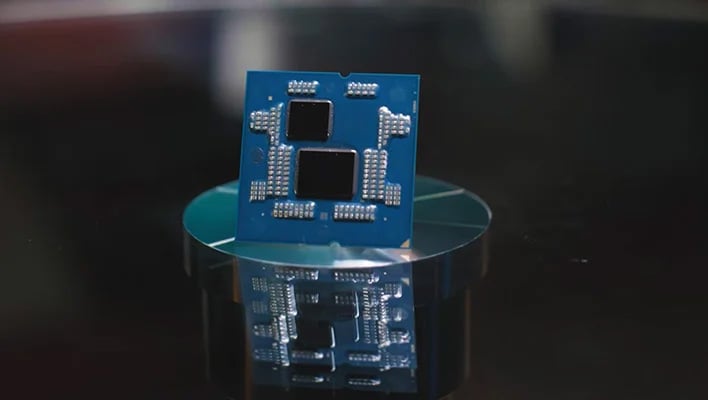It would be dopey of AMD to only release a single current-generation consumer processor (read:
Zen 5) with 3D V-Cache, and also unprecedented. So color us not the least bit surprised that a major hardware partner—Gigabyte, in case you skipped right past the headline—has essentially confirmed that at least one more Ryzen 9000X3D model is on tap.
The revealing nugget went largely unnoticed in a recent press release until the eagle-eyed geeks (and we mean that affectionately) at ComputerBase spotted Gigabyte's seeming confirmation of another 9000X3D chip. Gigabyte was intending to promote the launch of an 'X3D Turbo Mode' feature, but in the process it appears to have tipped AMD's hand.
"Gigabyte Turbo Mode is a cutting-edge feature that unifies cores distribution, bandwidth tuning, and hardware power balancing, resulting in pushing the boundaries of gaming performance. Empirical testing demonstrates that this feature delivers tangible benefits to gamers, with performance increases of up to 18% for incoming Ryzen 9000 series 16-core X3D processors, an astounding 18% for Ryzen 9000 non-X3D processors, and 5% for Ryzen 9800 X3D processors," Gigabyte wrote.
We bolded the pertinent portion of the press release, which reveals that AMD is prepping the launch of a 16-core Ryzen 9000X3D processor. That's notable because the only confirmed 9000X3D model at the moment is the
Ryzen 7 9800X3D, which AMD unveiled on Halloween Day.
For reference, the Ryzen 7 9800X3D is an 8-core/16-thread chip based on Zen 5, with a 4.7GHz base clock, up to a 5.2GHz boost clock, 8MB of L2 cache, 96MB of L3 cache, and a 120W TDP. Interestingly, the 4.7GHz base clock is 900MHz faster than the
Ryzen 7 9700X, which is the non-X3D equivalent (a Ryzen 7 9800X does not exist), while the boost clock is 200MHz lower.
Compared to the previous generation
Ryzen 7 7800X3D, the newly minted 9800X3D sports a 500MHz higher base clock and 200MHz higher max boost clock. Part of the reason for the higher clock speeds is because AMD relocated the 3D V-Cache to below the processor, which puts the core complex die (CCD) closer to whatever cooling solution is being used.
Regarding how many 9000X3D models might be in the wings, we'll have to wait and see. Note that the previous generation lineup had four models, including the Ryzen 9 7950X3D (16C/32T), Ryzen 9 7900X3D (12C/24T), Ryzen 7 7800X3D (8C/16T), and Ryzen 5 7600X3D (6C/12T). It's possible that we'll see the same lineup for the 9000X3D series, especially since Gigabyte just
spilled the beans about a 16-core model.

